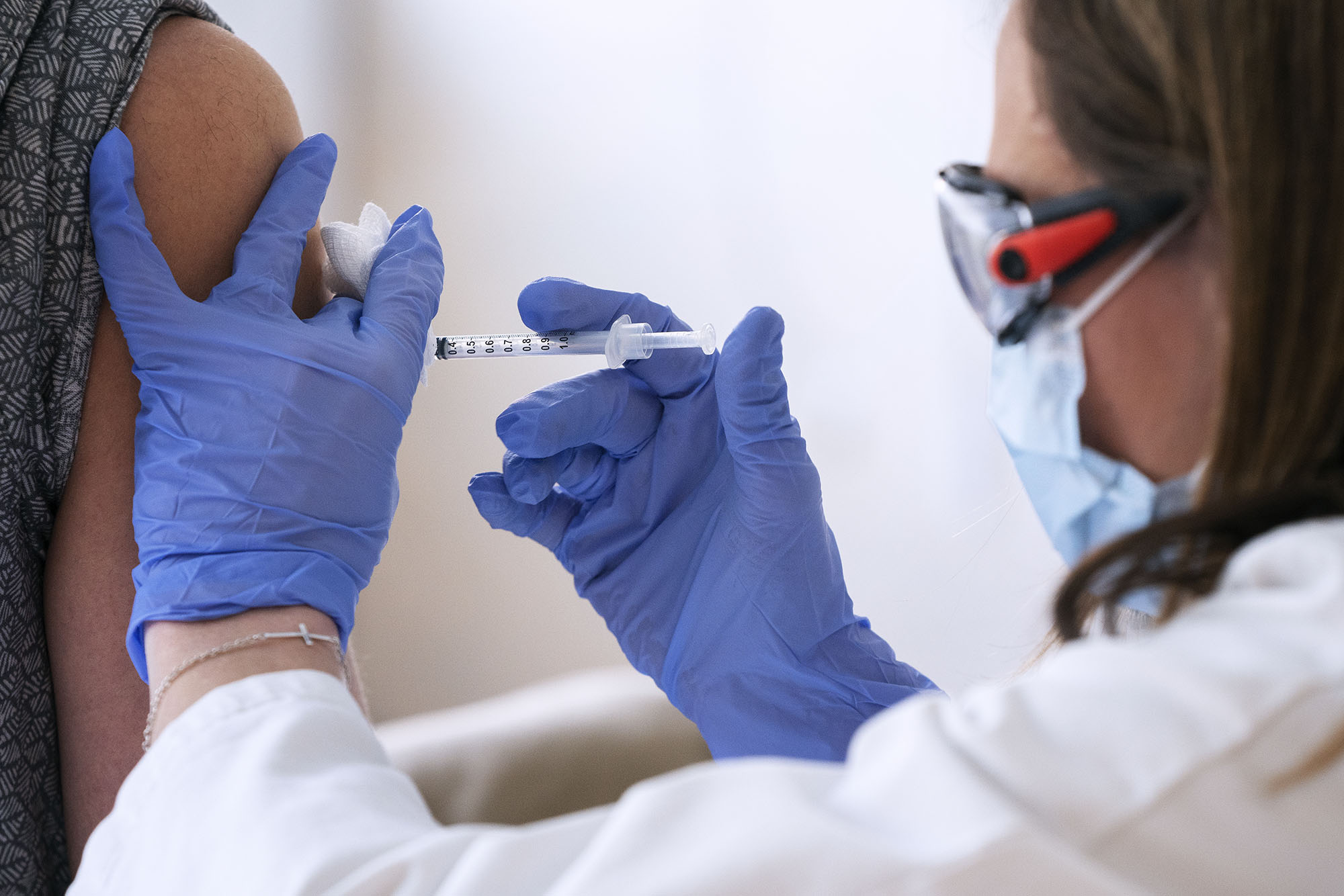When can I get a COVID-19 vaccine and how will it help me?
This is a key question on many people’s minds right now, as vaccination campaigns continue to ramp up across the U.S. in an effort to end the COVID-19 pandemic. In Charlottesville, UVA Health has provided more than 40,000 vaccine doses, Dr. Costi Sifri, director of hospital epidemiology, said in a virtual town hall Friday, meaning that about 25% of the Charlottesville population has had at least one dose of the vaccine.
This is excellent news, but more widespread vaccination raises its own set of questions. How much immunity do the vaccines actually confer? Can people who have been vaccinated still spread the virus? Is it safe to visit friends or loved ones who have had the vaccine?
Dr. Eric Houpt, chief of UVA’s Division of Infectious Diseases and International Health, joined us to answer some of those questions. Among other efforts focused on the pandemic, Houpt is overseeing the Virginia Coronavirus Serology Project, aiming to identify the true extent of mild and asymptomatic COVID-19 infectious across the state and better understand how close we are to herd immunity.
Here’s what Houpt had to say about the vaccines and the precautions we still need to take.
Q. What do we know about the immunity conferred by the vaccine, and what do we not know?
A. We know that the two vaccines that are currently available in the U.S. (Pfizer and Moderna) are highly protective (94% to 100%) against COVID-19 illness, including hospitalization and death. That’s fantastic – it’s what we want most from a vaccine, to protect people from getting really sick.
We don’t know how long vaccine immunity, or natural immunity [the immunity acquired after having the virus itself] will last, since we are learning everything in real time. Neutralizing antibodies after vaccination stick around for at least four months, and hopefully years.

Dr. Eric Houpt is the chief of UVA’s Division of Infectious Diseases and International Health, and has been studying COVID-19 immunity in Virginia. (Photo by Dan Addison, University Communications)
We also don’t know if or how well the vaccines prevent “carriage” or “asymptomatic infection” or “asymptomatic transmission” because the prior vaccine studies weren’t designed to carefully assess that. It seems likely the vaccines will reduce asymptomatic infection by some amount – the Moderna study found about 60% less asymptomatic infection at a single time point. Israel, which leads the world in vaccine roll-out, has indirect evidence that the elderly vaccinated-age population now carries much less virus in the nose than pre-vaccine. But we don’t have a clear picture yet on how well vaccines reduce carriage, particularly with some of the new variants, so this is currently being studied in depth.
Q. What about the new COVID-19 variants and how they interact with vaccines?
A. There is lots of talk about these COVID variants – maybe too much, because the bottom line is that the current vaccines have been highly protective against severe disease and I urge everyone to get a vaccine when they can.
The B.1.1.7 or “UK” variant appears to be more contagious and potentially more severe, so it’s bad, and is now here in the US and is expected to become dominant. So we need to maintain, if not increase, our masking, distancing and handwashing precautions. The current vaccines are highly protective against B.1.1.7, however, as is clear from Israel and other data.

There are additional variants, such as the B.1.351 or “South Africa” variant, that carries even more mutations. B.1.351 has also been found in the U.S. There are test-tube data that this variant is less neutralized by the Moderna and Pfizer vaccines, and a small study in South Africa showed that the Astra Zeneca vaccine (not currently available in the U.S.) was not protective against mild-moderate COVID-19 with B.1.351. Therefore, Pfizer and Moderna are developing booster shots against B.1.351 in case they are needed.
The next vaccine undergoing review at FDA this week is from Johnson and Johnson, a single-dose vaccine that I hope will be approved. It was highly (89%) protective against severe disease, even against the South Africa variant. In general, it appears that if reductions in vaccine effectiveness occur with the variants, we might see it in milder or asymptomatic infections first. This is the case with many other vaccines as well.
Again, the bottom line is that the existing U.S. vaccines have been highly protective against severe disease and I urge everyone to get a vaccine when they can.
Q. The CDC and other public health organizations have said the people who have been vaccinated should continue to wear masks and exercise public precautions. Why is this important?
A. This is very important because it remains possible that vaccinated individuals could carry the virus and spread it to others.
“Ultimately, the goal is that the vast majority of the population will be vaccinated such that the virus will no longer be able to spread and will dissipate, and then we can then resume normal pre-pandemic life without precautions. But we’re not there yet and there is still a lot of virus circulating, so I would personally, for the time being, still recommend vaccinated persons be careful amongst each other. ”
- Dr. Eric Houpt
Q. What are some considerations to take into account if you have not been vaccinated and want to visit someone who has been vaccinated, or vice-versa?
A. For reasons just mentioned, the vaccinated person should continue to exercise precautions (masks, distancing, handwashing) because they could still spread the virus to others. The unvaccinated person should absolutely continue to exercise precautions, because they could not only spread the virus to others, they could also catch it themselves and get sick.
Q. What about a visit between two people who have been vaccinated?
A. This is an interesting question, and I haven’t seen official guidance yet about this scenario. Ultimately, the goal is that the vast majority of the population will be vaccinated such that the virus will no longer be able to spread and will dissipate, and then we can then resume normal pre-pandemic life without precautions. But we’re not there yet and there is still a lot of virus circulating, so I would personally, for the time being, still recommend vaccinated persons be careful amongst each other.
While two vaccinated people should be protected from getting sick, it is possible they could still spread it to each other, which means they could then transmit it to others – for instance, when they go home to their bubbles that may not be fully vaccinated yet. I am fortunately fully vaccinated and recently visited my fully vaccinated 78-year-old mother, and we still stayed 6 feet apart and wore masks.
Q. How might these precautions change as more and more people in the U.S. are vaccinated, if at all?
A. I think we will follow the COVID-19 numbers and the percent of the population vaccinated, and we will document if and how protective the vaccines are against carriage of the circulating strains. We can then put those facts together to tell us when we can decrease precautions. We’re not there yet, we are still in the middle of this and need to stay vigilant.
Q. Is there anything else you want to add?
A. We forget to mention that influenza has been massively reduced this winter, almost certainly because of all the mask-wearing and distancing we are doing. So our precautions are certainly effective, and that’s good. The problem is that COVID-19 is even more contagious than influenza. It’s a really formidable virus, which is why we need to fasten our seat belts and stick with our precautions a while longer.
Media Contact
Article Information
February 23, 2021
/content/qa-can-i-go-visit-my-elderly-relatives-and-other-key-vaccination-questions

